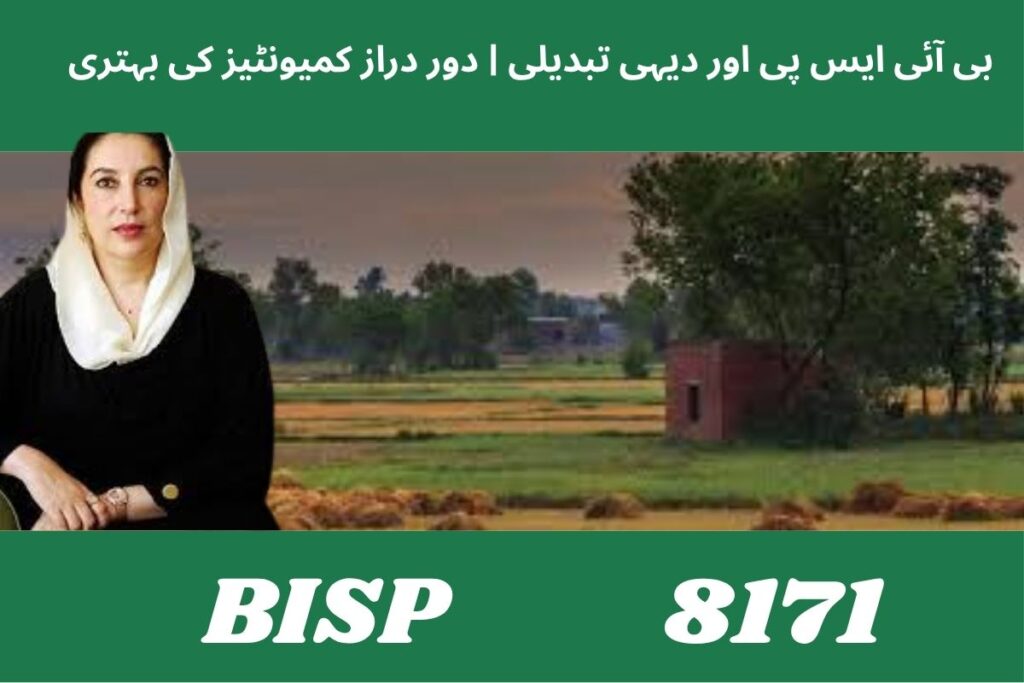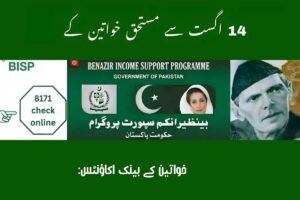Introduction: Beacon of Hope in Remote Region
In the distant villages of Pakistan, progress is often slow. Simple needs such as drinking water, education, healthcare, and a regular income are a hard to obtain, and many families are struggling to make ends meet. These are areas that have longed for a big change for years.
This is where the Benazir Income Support Programme (BISP) is coming in. Conceived to eradicate poverty to begin with, today it has transformed into a powerful force for rural emancipation and thus has touched the lives of even the remotest, poorest of poor and helping them build a future full of hope and contentment.
This piece explores how BISP is creating tangible change in rural areas through cash transfers, entrepreneurial opportunities, local economies and working hand in hand with local governments.
How Far is Too Far: Bringing assistance to remote villages
It’s hard to provide support to remote regions. There are no basic amenities in many villages while some are several hours away from the nearest town. BISP, however, has successfully managed this through inventive, community-based remedies.
How BISP Reaches Out to Rural Families:
Poverty profiling: Teams go house to house to determine which the poorest families are.
Local Registration Drives: BISP establishes camps at convenient locations for registration.
Mobile Banking Agents: In places where it is a challenge to reach a bank, the trained agents distribute payments upfront.
Digital Systems: Payments now go directly to mobile phone or bank accounts.
Support Centers: Support centers in the countryside provide support and resolve issues at the grassroots.
This integrated system provides for steady and sustainable support to even the most remote of villages.
Promoting Village Economies: The Ripple Effects of Cash Transfers
Yes, the money that BISP hands out may sound small, but the effect is enormous – especially in a place where a rupee goes a long way. Our families get a payment and they’re also giving back to the town.
What Happens When There’s Money:
Local Small Business Expansion: Businesses from stores, street vendors, to service providers experiencing a surge in customers.
Agricultural Development: Additional resources enable farmers to purchase seeds, tools and animals, increasing productivity.
Women Empowerment: Women invest in the well-being of their families, send children to school, and save for unexpected emergencies.
Local Spending: Local families spend money locally instead of traveling to do shopping.
As the money circulates, it helps local trade to develop, raises demand for services and supports the opening of new jobs, thereby boosting opportunities and the local economy.
Addressing Rural Infrastructure Challenges
Even today, many of those rural areas do not have basic services like roads, electricity, mobile networks and clinics. Though BISP itself isn’t undertaking construction, it is contributing to a catalyst for infrastructural progress.
BISP and Its Role in Infrastructure Development:
Increasing Service Demand: More help leads to the demand for better roads, health care and connectivity.
Local Government Collaboration: BISP collaborates with local government departments to increase linkages with services such as digital kiosks and ambulance services.
Bringing services closer: Mobile registration and new support points are making it easier for people to access assistance.
With the help of its efforts’; BISP is narrowing the gap between rural and urban, so that services are reachable to those who deserve the most.
Growing Entrepreneurs: Strengthening small business owners at home
When families no longer have to worry about their day-to-day survival, they can invest in their long-term growth. Rural entrepreneurship thrives in such a milieu, and BISP is instrumental in nurturing these ambitions.
What Is BISP Doing To Help Small Businesses?
Stability Leads to Confidence: Reliable financial aid gives families the security they need to launch new initiatives.
Vocational Training: BISP provides vocational training in skills such as sewing, handicrafts, cooking and tech services.
Small Beginnings: Families open up home-based businesses or small shops, using the extra income.
Peer-To-Peer Learning:Success leads to imitation, and a domino effect of entrepreneurship.
This transition — from dependency to self-sufficiency — is one of BISP’s greatest gifts to the people of rural Pakistan.
Empowering Women: A Cultural Transformation
One of the features of BISP has been the cash transfer being paid mostly to womenfolk in the country, and the good part of it is that the move is creating a silent cultural revolution in the country.
Why Women’s Financial Empowerment Matters:
Superior household management: Women are generally more likely to spend on food, education and health.
More Confidence: When women take control of their financial future, they up their status and the amount of respect they get in the family and community.
Generational Change: Educated, empowered mothers are raising children with greater ambitions.
Women Entrepreneurs: Financially independent women often open businesses or participate in local trade.
It is changing the social dynamics of rural Pakistan as Bisp is providing the tools and self-confidence for women to take leadership roles in their homes and communities.
Local Governments: Ensuring Program Success
Where BISP does well is when local governments step up and make sure the program is targeting the needs of their state or district.
How Local Authorities Contribute:
Targeting Families in Need: Village councils and district offices support with the data and reaching out.
Monitoring and Delivery: Local management ensures that the money and the facilities are used as they should be.
Public Awareness Campaigns: Provincial and regional governments support educating local residents about their rights and how to access BISP.
Relevant Organisational Links/Other Services: Local health, education and livelihood programme are purseued with FSP to ensure impact.
When national programs collaborate with local governments, it increases the reach and builds trust in communities.
Frequently Asked Questions
Does BISP reach remote villages?
Yes. BISP ensures, through mobile agents and digital tools, that even the most remote families get their payments on time.
How BISP propels local economy?
Through boosting household spending, BISP generates business for local shopkeepers, farmers and service providers.
Can women take loans and start businesses with the blessings of BISP?
Yes, lots of women use their money in financial aid to start small businesses or buy things they need to earn.
What if there’s no infrastructure?
BISP is building demand for better services, pressuring local governments to repair roads, supply electricity and improve connectivity.
Is cash transfer all BISP is about?
No It’s BISP is widening its horizon of services to include training, support for education and collaboration with other programs to achieve sustainability.
Conclusion: Creating a Bridge to Stability and Opportunity
The Benazir Income Support Programme is more than a cash transfer programme; it represents the hope for a new future in rural Pakistan. Through unwavering assistance, encouragement of entrepreneurship, and empowerment of women, Islamabad can lift communities who were once so easily forgotten.
Sustained support and engagement with local administration will enable BISP to establish an enabling environment for rural development in the longer run, demonstrating that even the remotest village can transform into a prosperous one with the right support.






